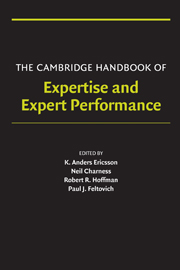Book contents
- Frontmatter
- Contents
- Acknowledgments
- Contributors
- PART I INTRODUCTION AND PERSPECTIVE
- PART II OVERVIEW OF APPROACHES TO THE STUDY OF EXPERTISE – BRIEF HISTORICAL ACCOUNTS OF THEORIES AND METHODS
- PART III METHODS FOR STUDYING THE STRUCTURE OF EXPERTISE
- PART IV METHODS FOR STUDYING THE ACQUISITION AND MAINTENANCE OF EXPERTISE
- PART V DOMAINS OF EXPERTISE
- PART VI GENERALIZABLE MECHANISMS MEDIATING EXPERTISE AND GENERAL ISSUES
- 34 A Merging Theory of Expertise and Intelligence
- 35 Tacit Knowledge, Practical Intelligence, and Expertise
- 36 Expertise and Situation Awareness
- 37 Brain Changes in the Development of Expertise: Neuroanatomical and Neurophysiological Evidence about Skill-Based Adaptations
- 38 The Influence of Experience and Deliberate Practice on the Development of Superior Expert Performance
- 39 Development and Adaptation of Expertise: The Role of Self-Regulatory Processes and Beliefs
- 40 Aging and Expertise
- 41 Social and Sociological Factors in the Development of Expertise
- 42 Modes of Expertise in Creative Thinking: Evidence from Case Studies
- Author Index
- Subject Index
- References
41 - Social and Sociological Factors in the Development of Expertise
from PART VI - GENERALIZABLE MECHANISMS MEDIATING EXPERTISE AND GENERAL ISSUES
- Frontmatter
- Contents
- Acknowledgments
- Contributors
- PART I INTRODUCTION AND PERSPECTIVE
- PART II OVERVIEW OF APPROACHES TO THE STUDY OF EXPERTISE – BRIEF HISTORICAL ACCOUNTS OF THEORIES AND METHODS
- PART III METHODS FOR STUDYING THE STRUCTURE OF EXPERTISE
- PART IV METHODS FOR STUDYING THE ACQUISITION AND MAINTENANCE OF EXPERTISE
- PART V DOMAINS OF EXPERTISE
- PART VI GENERALIZABLE MECHANISMS MEDIATING EXPERTISE AND GENERAL ISSUES
- 34 A Merging Theory of Expertise and Intelligence
- 35 Tacit Knowledge, Practical Intelligence, and Expertise
- 36 Expertise and Situation Awareness
- 37 Brain Changes in the Development of Expertise: Neuroanatomical and Neurophysiological Evidence about Skill-Based Adaptations
- 38 The Influence of Experience and Deliberate Practice on the Development of Superior Expert Performance
- 39 Development and Adaptation of Expertise: The Role of Self-Regulatory Processes and Beliefs
- 40 Aging and Expertise
- 41 Social and Sociological Factors in the Development of Expertise
- 42 Modes of Expertise in Creative Thinking: Evidence from Case Studies
- Author Index
- Subject Index
- References
Summary
We have serious difficulties when it comes to explaining what really defines an “expert” – a difficulty that goes beyond the explanatory range of defining experts by their individual performance. Take, for example, people who provide political advice or consult multinationals. What would qualify them as experts? How can we assess their performance? How can we disentangle their individual expert contribution and the success of the enterprise or party they work for? We cannot understand these cases if we don't consider what Hoffman, Feltovich, and Ford (1997) concluded: the “minimum unit of analysis” is the “expert-in-context” (p. 553)(see also Clancey, Chapter 8).
For the purpose of this chapter on social and sociological factors in the development of expertise, I assume that an expert has to be regarded as the connection between a person and a function. The function indicates the social context of the expert performance. In the following, I use a broad notion of function that includes both the pertinent duties and the effects of expert performance, such as the duties and work of a doctor, as well as the effect of music on its audience. In short: I understand function as defined by what an audience, patient, or customer would pay for. The function of medical therapy is to render a sick person healthy. The function of music is to please the audience (as entertainment) or peer professionals (as being excellent).
- Type
- Chapter
- Information
- The Cambridge Handbook of Expertise and Expert Performance , pp. 743 - 760Publisher: Cambridge University PressPrint publication year: 2006
References
- 37
- Cited by

